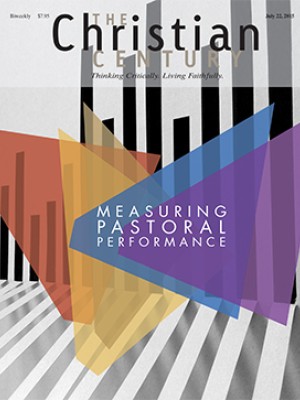Evaluation essentials
Read the main article on the importance of pastoral evaluations.
It’s not difficult to set up a comprehensive evaluation process; it takes more will than ingenuity, more desire than resources. Plenty of resources for standard review processes are available through area congregations, businesses, organizations, and denominational centers. Almost any template will need to be adapted for one’s local setting. But a review model, a purchased resource tool, or even a form used by another institution provides a starting point.
Part of the success of an evaluative system is not simply the quality of a written form but the supervisory culture that’s established and the healthy relational climate that makes review conversations fruitful. It may take years to grow a congregation’s culture on these fronts. But that’s no reason to hold off on the idea until some perfect alignment of the stars occurs. A few key leaders can get the ball rolling.
Read our latest issue or browse back issues.
Smaller congregations may not be able to assemble a team. In this situation, it’s sufficient to identify two or three individuals who can perform the task well. Congregations large enough to create a personnel committee must select members who possess wise judgment, circumspect thinking, and a capacity to retain strict confidentiality. Appointing members to these teams is preferable to electing them.
All good systems of review have a few basic elements:
• An annual review. The key to a once-a-year format is not to save all performance concerns for the scheduled review. A pastor or church employee deserves to be part of conversations throughout the year about big and little matters related to effectiveness and impact. If these conversations take place throughout the year, formal staff reviews will not blindside the employee with surprises. For new employees and freshly situated pastors, a 90-day check-in review is helpful and considerate.
• Specific feedback. Evaluators center their feedback on the position description and on mutually agreed-upon goals established each year. Without these mooring posts, a review can easily deteriorate into a trading of opinions. For many congregations, accurate, uniform, and concise position descriptions must be created before a review system can be put into place. These need be no more than one page in length, but they should be updated periodically. (Yes, pastors should have job descriptions.)
• Constructive and collaborative reviews. Well-led reviews offer the opportunity to affirm and encourage employees while also pinpointing areas that need attention. Conversation and narrative are more important than marking boxes to grade performance. Face-to-face reviews are a must.
• Reviews conducted by supervisors. Obviously, such reviews are strong only if supervisors clearly understand their role and are trained for it. In the case of the review of a solo or lead pastor, two or three congregational leaders usually guide the conversation. Soliciting other staff perspectives on a lead pastor can assist reviewers. Staff submit a confidential form that has no employee’s name attached to it. Supreme confidentiality in this type of 360-degree review is critical. No comments obtained confidentially for this purpose should ever be shared with the pastor.
• Realistic goals. The SMART formula—specific, measurable, achievable, realistic, timely—works well as a benchmark for establishing goals.
• Written documentation. Documentation is important to track growth and provide a reference point for further conversation. Documentation also helps prevent casualness of process. It is fitting to invite staff members to add written comments before or after the review. These remarks should be attached to the evaluation that is filed for permanent record. Signatures of both parties on evaluation documents are appropriate; they indicate only that one has read the report—not that one necessarily agrees with every conclusion in it. Some congregations have both the employee and the employer fill out an assessment form prior to their meeting, which provides a springboard into the review conversation.
Excellence in ministry grows when leaders give attention to thoughtful feedback. Congregations that develop good review structures not only do a favor for their pastor or staff, they also inspire internal morale and confidence for what they hope their church will accomplish in the world.







